The First World War brought about a turning point to Silesia in Germany, which lost quite some territory in Upper Silesia. Many members of the Richthofen family died in the trenches of the war.
Manfred (1855-1939, Barzdorf) would be a typical member of the family at the time of the German empire. His military career was closely connected to the traditional regiment of the Gardes du Corps. As an officer of this unit he served as personal flank adjutant to the last emperor in charge of military and representative services. He fought at both the western and eastern fronts during the First World War and ended his military services at the rank of a deputy general of the Guards Corps in Berlin.
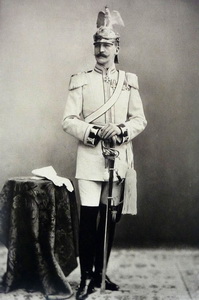
General Manfred Karl Ernst Freiherr v. Richthofen (1855-1939)
Manfred Freiherr von Richthofen (1892 – 1918), the so-called Red Baron, is the most well known of all members of the Richthofen family. Enjoying world wide acceptance there have been numerous publications and films about him. Manfred stands for a new technology in warfare. He was the most successful German fighter pilot, who not only served as a role model for his comrades but who was also highly respected by his enemies. He was able to handle any new flight technology in a courageous and skilful way and at the same time he took on responsibility for his fellow pilots leading his squadron as a competent commodore. The flying methods he tested have been pointing the way in training pilots ever since. However, being celebrated a hero, Manfred was also victim of the madness of war because political leaders of both systems, the German Empire and National Socialism tried to instrumentalize him for their propaganda. In 1961 the fighter squadron no. 71 was awarded the title “Richthofen” bearing this name ever since.
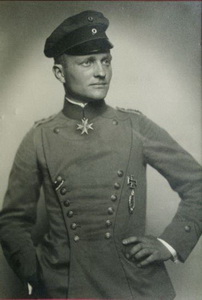
Manfred Freiherr v. Richthofen (1892-1918), Red Baron, flying ace in WW I
Manfred’s younger brother Lothar Freiherr von Richthofen was equally able and respected as a combat pilot. Having survived three plane crashes he lived to see the end of WW I in hospital. Serving a traffic pilot in post war years his plane’s engine failed on a flight between Berlin and Hamburg resulting in a final deadly crash.
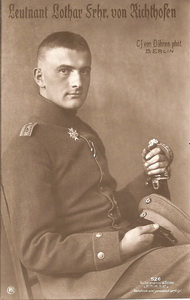
Lothar Freiherr v. Richthofen (1894-1922), flying ace in WW I
During the First World War 1,8 million Germans lost their lives. Most of them were soldiers for whom war memorials were set up in the tradition of the Napoleonic wars, for example in the village of Faulbrück (Moscisco) in 1938. Its memorial was dedicated to the three sons of Karl Hermann (1860-1915, Ober-Faulbrück) who was head of the provincial government of Silesia: Gottfried (1895-1915) died in Galicia, Siegfried (1897-1914) in Russian Poland – aged 17 – and Eberhard (1899-1918) died in France. His eldest son Ulrich (1894-1971) only survived WW I because he was called home to take over the family business after his father’s death in 1915. The war memorial in Faulbrück was destroyed after WW II. However, the Polish parish has started to re-erect it with boulders found in a deserted quarry nearby.
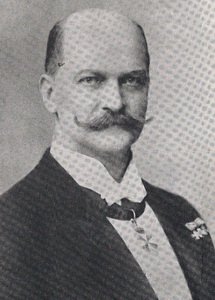
Karl Hermann (1860-1915), head of the Silesian provincial government
In 1919 the Weimar Constitution, passed by a freely elected National Assembly, was supposed to provide democratic structures aiming at unity and freedom. Yet political turmoil, inflation, the world economic crisis, much disappointment and lack of identification among the old elite with the new political system led to the failure of the Weimar Republic providing the breeding ground for National Socialism. The Third Reich is responsible for severe injustice, genocide and the Second World War leading Germany into its deepest moral crisis and decline. 80 million people worldwide lost their lives in military action, through the consequences of war, through mass crime and genocide. 5.3 million drafted German soldiers died.
In our family, too, there were only few who were convinced of the young democracy and who realized the dangers of National Socialism. While assessing the social and political development in those days, the general agreement on mutual values among the family got lost in the face of polarization by National Socialism. …
Among the post WW I personalities were for example:
Hartmann Freiherr von Richthofen (1878-1953, Schloss Gothard) second son of Oswald, state secretary of the exterior, was a member of the Reichstag in its second and third term of office. He represented the constituency Rotenburg/Wümme and was a member of the German Democratic Party.
Prätorius (Peter) Freiherr von Richthofen (1879-1949, Boguslawitz) represented the Breslau (Wroclaw) constituency for three terms of office in the Reichstag until 1930. He was a member of the German National Party. Developing his agricultural property to model estates he was also head of the Silesian farmers’ association.
Ernst (1858-1933, Mertschütz) was head of the district, member of the Prussian House of Representatives and member of the Lower Silesian provincial government.
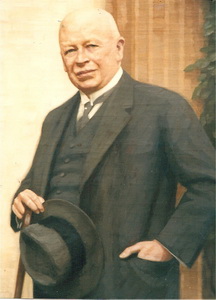
Ernst Freiherr v. Richthofen (1858-1933), member of provincial parliament
Carl (1872-1949, Kuhnern) with a PhD in law was vice president of the Silesian Chamber of Agriculture representing estate owners.
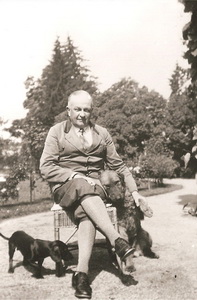
Carl Freiherr v. Richthofen (1872-1949)
Herbert (1879-1951), also a lawyer, joined the Foreign Office in 1905 after completing his PhD. Having served as a senior official between 1921 and 1930 he was an envoy to Kopenhagen from 1930 to 1936 as well as to Brussels from 1936 to 1938 and to Sofia from 1939 to 1941 when he was removed by General Joachim von Ribbentrop, then foreign minister, and replaced by a follower loyal to the Nazi regime. In May 1945 he was deported by Soviet officers and only after 6 years as Russian prisoner of war was he sentenced to another 25 years in jail. Shortly after this conviction he died, aged 72, in a camp hospital on the Wolga river on 25 December 1951. The Richthofen family is striving to achieve his rehabilitation and welcomes an initiative of research on Herbert. He was acquainted with many well-known people of his time, such as Olaf Gulbransson, Carl Zuckmayer, Max Liebermann, Max Reinhardt and Gerhard Hauptmann. The painter, etcher and lithographer Rudolf Großmann created a portrait of Herbert.
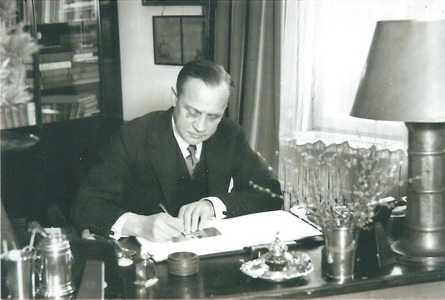
Herbert ( 1879-1952), envoy
Bolko (1899-1983), Mertschütz), was working academically as a professor of prehistory and ancient history at the time.
The „Richthofen Sisters“ were typical avant-gardists of their time, Else (1874-1973) and Frieda (1879-1956). Else earned her PhD as one of the first women at a German University. Her professional life began 1901 at the newly founded industrial inspectorate in Baden, where she enforced safety and occupational health of workers. She was married to Edgar Jaffé, Dr. Jur. Bavarian Minister of State and professor for national economy at Munich University. Else fell in love with her academic mentor, the nation economist Max Weber.
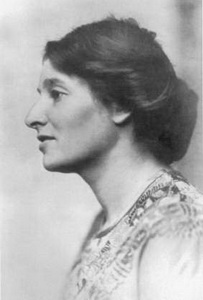
Dr. phil. Elsa Freiin v. Richthofen, wedded Jaffé (1874-1973)
Frieda became D. H. Lawrence’ congenial companion in life, the Lady Chatterley of his famous novel.
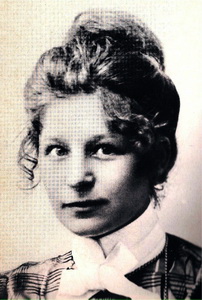
Frieda Freiin v. Richthofen, wedded Lawrence (1879-1956)
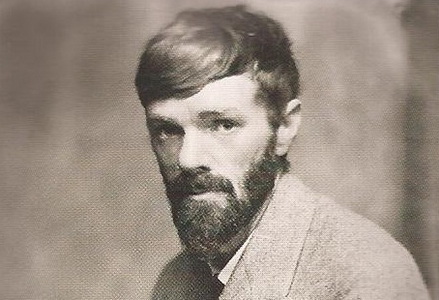
D.H. Lawrence (1885-1930), Writer
Heinrich (1889-1986), Riemberg, became a famous painter and later professor at the Kunstakademie Düsseldorf, (ref. Kunstgalerie Heinrich von Richthofen). His wife Irene born Winkel (1891-1941) was a talented painter and illustrator.
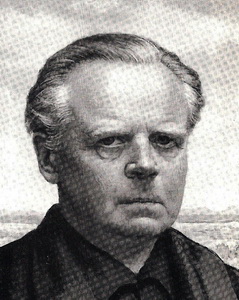
Heinrich (1889-1986), Professor at the academy of arts Duesseldorf
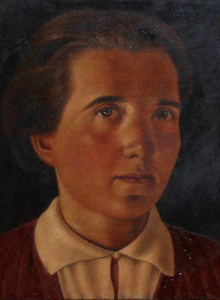
Irene Frfr. v. Richthofen-Winkel (1891-1941)
Wolfram (Ulf) Freiherr v. Richthofen (1895-1945), Dr.-Ing., was the most prominent military leader of the family during the Third Reich. The general of the Luftwaffe and field marshal still earns a lot of attention amongst military strategists – in the USA in particular – for his military aptitude. As commander of the „Legion Condor“ during the Spanish Civil War, he ordered the carpet bombing of the Baske city of Guernica. Pablo Picasso’s monumental painting „Guernica“ is a powerful accusation against this atrocity. Ulf died after sever illness on the 12th of July 1945 in Bad Ischl.
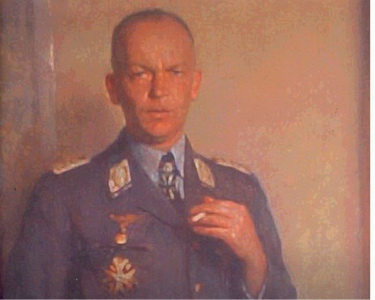
Wolfram (Ulf) Freiherr v. Richthofen (1895-1945), general field marshal
Dieprand Freiherr v. Richthofen (1875-1946), Dr. jur., was vice president of the Reichsgerichts in Leipzig from 1939 to 1942 (civil law). We would also like to commemorate our family members that rejected National Socialism. The families of the Reichstag parliamentarian Praetorius (Peter) and his siblings were discriminated by the Nazi Arian doctrine. Peter withdrew jaundiced from his public functions and focussed on his agricultural ventures.
Dr. Wilhelm Freiherr v. Richthofen (1888-1962) studied in Oxford and was an outspoken proponent of English Liberalism, which he published as ideal model in various places. He made no secrets about his rejection of National Socialism. Wilhelm was lucky enough to flee to England in time escaping Nazi murder.
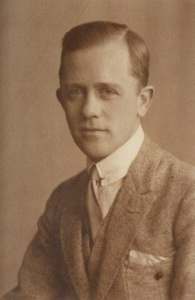
Dr. Wilhelm Freiherr v. Richthofen (1888-1962)
Wilhem was expatriated by the „Vermögensverwertungsstelle Oberfinanzpräsidium Berlin“, the agency that confiscated Jewish assets in the process of denationalisation. Wilhelm was a non-Jewish victim of the Nation Socialist Apparatus. Albrecht (1887-1945), Leipitz, was a close friend of Count Michael v. Matuschka, politician of the „Zentrum“ party and district administrator in Oppeln. Matuschka was accused of cognisance of the assasination attempt on Hitler of the 20th July 1944 and sentenced to death by hanging. As a sign of civil courage, Albrecht declared to take care of the „Verräterkinder“ of his murdered friend. Albrecht commited terminated his life when the Soviet troups marched in.
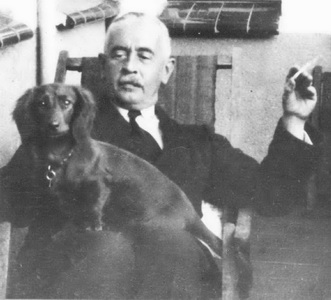
Albrecht Freiherr v. Richthofen (1887-1945)
His brother Walter (1880-1941), Leipitz and Heidersdorf, made no secret about his rejection of National Socialism in front of a Nazi inspector. The verbal exchange was so agitated that he died of a stroke on his office desk.
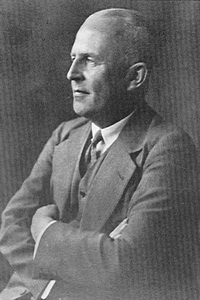
Walter Freiherr v. Richthofen (1880-1941)
Wolf-Manfred (1922-2010), Cammerau, son of the WWI flying ace Lothar – a venerated war hero by the Nazi system – was part of a younger generation to reject Hitler and his ideology. His clear judgement was routed in his education at the boarding schools of Mistroy on the Pommeranian island Wollin in the Baltic Sea and the the Moravian Brethren in Niesky, as well as the influence of his grand parents the Counts v. Keyserlingk, in return close friends to Praetorius (Peter) Freiherrn v. Richthofen
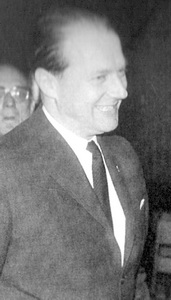
Wolf-Manfred Freiherr v. Richthofen (1922-2010)
Karl (1916-1958), Damsdorf showed tremendous courage by choosing his dissertation topic „Untersuchungen zur Staatsauffassung des Polybios“. His work on the relation of state and individuum was not published due to circumstances of the War.